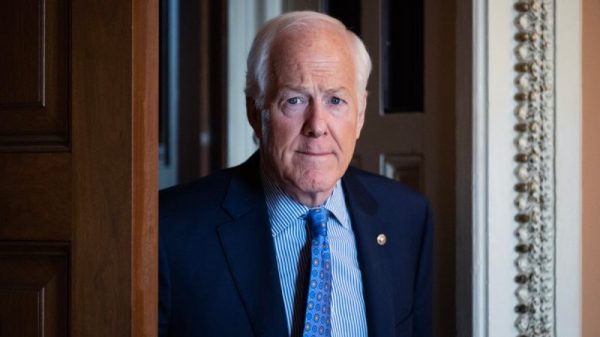Speaker Mike Johnson (R-La.) spent his first two weeks atop the House Republican leadership rung rarely opining and instead just listening.
In his first meeting with one of the conference’s five ideological factions, Johnson listened as the House Freedom Caucus passionately argued to curb spending, prioritize national security in upcoming fiscal fights and temporarily set two deadlines to fund the government into early next year.
Days later, moderate Republicans implored Johnson to avoid making swing-district lawmakers take tough votes or face an embarrassing defeat when they revolted on the House floor. He then listened as appropriators — tasked with assigning how federal funds are spent each year — pleaded that he avoid a government shutdown by ignoring the two-tier proposal and instead passing a clean extension of current funding levels, arguing that the hard right would probably vote against any short-term measure.
After attending three meetings with Johnson, Rep. Dave Joyce (R-Ohio) eventually blurted out: “What do you want?”
Joyce and the Republican conference got their answer Saturday. Johnson ultimately decided to move forward with a stopgap funding proposal meant to appease the hard right while trying not to alienate the centrists. The result was a two-tiered funding schedule that does not include other demands from across the GOP conference, like steep budget cuts, a border security proposal and funding for Israel or Ukraine.
Instead of appeasing just one ideological faction, the proposal has angered the hard right, puzzled the middle and was mocked by the White House. But it may attract enough support, including from Democrats in the House and Senate, to land on the president’s desk this week.
How Johnson handles the threat of a government shutdown at the end of the week is his first major test and will set the stage for the rest of his speakership.
He faces the herculean task of uniting an ideologically fractious conference that has been pulled further apart after a contentious speakership fight that exposed and strengthened lingering resentments, policy differences and doubt that Republicans can ever find consensus again. Johnson has never served in a highly placed leadership role that would have forced him to know a broad swath of the conference, and he has stepped into the fray at a time when a leader is critical not only to the functioning of American government but also to decisions related to aiding foreign democracies.
Of the approximately two dozen Republican lawmakers and aides interviewed by The Washington Post — many of whom spoke on the condition of anonymity to speak freely about internal party discussions — a significant number acknowledged granting Johnson a “grace period” to find his footing in a job that very few would ever want. But how he manages the demands from across the conference could abruptly end the honeymoon period as soon as this week.
“People want to give Mike grace to be able to move forward. But at the end of the day, we have a job and the clock is ticking. You’re storming the beaches of Normandy and somebody goes down, you don’t sit around and form a committee,” Rep. Chip Roy (R-Tex.) said about Johnson’s approach to listening and incorporating requests. “Time is ticking and we got to go get it done.”
For Roy, who is a member of the Freedom Caucus, that grace period has ended. He announced on X, formerly known as Twitter, that he will oppose the stopgap funding bill because it’s “clean.”
After weeks of listening, Johnson decided to marry the two major requests of the hard right and pragmatic factions by extending existing funding levels for some government agencies into mid-January and the others until early February. If adopted, the plan would force the House and Senate to find compromise on their full-year appropriation bills to fund the government for the 2024 fiscal year before those deadlines.
Johnson’s choice on stopgap funding comes after he already shepherded House passage of a $14 billion aid package to Israel by reallocating funds already appropriated to the Internal Revenue Service — a decision many Republicans lauded him for.
But hard-right members immediately rejected the short-term funding plan over the weekend, frustrated that it doesn’t include border policy provisions, spending cuts or funding for Israel. There is also widespread recognition from lawmakers and senior aides that it will need Democratic votes to pass.
When asked last week whether he would support a staggered continuing resolution, or CR, with no other policy riders attached to it, House Democratic Leader Hakeem Jeffries (D-N.Y.) called the idea “ridiculous.”
But now that the plan is official and a shutdown looms, Democrats are signaling an openness to the idea by not broadly criticizing it. A senior House Democratic aide said leadership is “still discussing” how to approach the measure. They appreciate that there are no conservative poison pills attached but think the staggered approach is overly complicated. Democrats also worry that they could lose their leverage to pass emergency funding for Ukraine and Israel.
The lack of spending cuts and decision to fund the Defense Department until February have also appeased some Senate Democrats who were wary of the two-tier approach. Democrats historically fear that Republicans would be willing to shut down the entire government if defense funding is complete. This proposal keeps defense funding on the table to provide incentive to fund the rest of the government.
“It’s a good thing the Speaker didn’t include unnecessary cuts and kept defense funding with the second group of programs,” a Senate Democratic leadership aide said.
Besides averting a government shutdown, Johnson also must overcome deep policy disputes to finish passing full-year funding bills and approve must-address reauthorizations touching farming and federal aviation before year’s end. Meanwhile, he has to navigate waning support for Ukraine aid while managing ongoing demands for the passage of a border security bill.
“This will be a very heavy lift and Johnson will need to expand tons of political capital,” one House Republican lawmaker said of Johnson’s attempt to pass the stopgap bill. “Maybe he gets there in this honeymoon phase.”
Several Republican lawmakers noted that unlike former speaker Kevin McCarthy (R-Calif.), who was ousted after passing a short-term funding bill that relied on Democratic support, Johnson is starting the job without any enemies — in part because many members do not know him outside of his reputation as a policy-driven and religious conservative. Though Johnson’s lack of intraparty controversy and personal vendettas is part of why Republicans unanimously supported him for speaker, he faces a trust deficit among some pragmatic lawmakers, who believe McCarthy earned their fealty by helping them get elected and ensuring they return.
Johnson has the most to prove with governing-minded Republicans as he has been largely embraced by the hard-right faction, a group he has aligned himself with since being elected to Congress in 2016. Though McCarthy incorporated members of the Freedom Caucus into weekly meetings — unlike his GOP predecessors — lawmakers within the group were struck by Johnson’s decision to meet with them first only days after becoming speaker.
“I’m really, really pleased to see that he is being so inclusive, specifically with the Freedom Caucus,” said Rep. Matthew M. Rosendale (R-Mont.), who was one of eight Republicans who voted to oust McCarthy as speaker last month.
Johnson earned praise for his earlier decision to pair aid for Israel with rescinding Democratic-approved funds to hire more IRS employees. Doing so is projected to add to the deficit, but Republicans celebrated it as a show of unity since it paired the desire of many to help a foreign ally while assuaging fiscal conservatives’ concerns.
“He really has done a good job of threading the needle between sort of the traditional Republican world and the ‘America First’ Trump world. He’s pretty unique in that he speaks both dialects fluently,” said Rep. Drew Ferguson (R-Ga.), one of Johnson’s few close allies in the House.
But others are not convinced yet, fearing Johnson may be giving lip service to all factions ahead of making decisions that will result in broken promises. Some Republicans have taken his tendency to seek overwhelming input as his — or any Republican in his position’s — inability to successfully weave concerns into a solution that does not ultimately irk the hard-right flank.
“Johnson is allowing the inmates to run the asylum,” one senior GOP leadership aide said.
Before Johnson made his decision on a proposal to avert a government shutdown, many governing-minded Republicans said that he should ultimately support passage of a clean funding extension until January that possibly tacks on Israel aid, because members of the Freedom Caucus would not move to oust him immediately if he did. While several Freedom Caucus members said they would not make a motion to vacate Johnson from the speakership, several privately admitted a decision to pass a clean funding extension — ostensibly with the help of Democrats — would start to test their patience.
Johnson will have to continue reassuring both factions of the conference as he moves ahead on tackling must-address issues.
He had been telegraphing to pragmatic lawmakers in private conversations that he does not support a government shutdown and wants to fund aid to Israel and Ukraine through offsets, a position that fiscal conservatives across the conference support. In one conversation with a vulnerable Republican, Johnson assured them he could not allow the government to shut down because he could not bear running into military service members at his local grocery store and knowing they are not getting paid.
During a luncheon with the centrist Republican Governance Group, several lawmakers asked him to avoid making them vote on abortion-related issues because it could hurt their reelection chances, according to four people present. In response, Johnson said he had met earlier with several antiabortion groups and told them not to expect the GOP majority to pass a federal abortion ban or similar measures because vulnerable Republicans could not handle the political implications. He also noted that a federal abortion bill would not pass a Democratic Senate, according to a person in the room.
Some Republicans left the gathering concerned that Johnson had suggested siding with the base on other issues, particularly on how to navigate the looming funding deadline. Most, however, are taking him at his word.
“Why wouldn’t I trust him? I don’t have any other reason not to,” Rep. Lori Chavez-DeRemer (Ore.), a vulnerable Republican incumbent, said after attending the meeting. “So I’m giving the new speaker the benefit of the doubt. If that’s what he says, that’s what I’m going to go off of unless he proves differently.”
Other moderate Republicans have described their group as “free agents” now since their loyalty to McCarthy had forced them to take tough votes for the sake of party unity. They made clear to Johnson that they will vote against controversial bills more often, especially if he puts issues on the House floor that go against the desires of their constituents.
“The reality is to get his job done and function, he’s going to need a bunch of us. And that’s something that I think he understands, and something he’s got to figure out,” said Rep. David G. Valadao, who represents a swing-district in California.
The demands from across the conference have already tested Johnson. Since ascending to the speakership, he has had to pull consideration of a bill funding the transportation and housing departments for a full year because New York Republicans are protesting a deep slash to Amtrak funding while the Freedom Caucus is pushing for those cuts. Eight swing-district Republicans were planning to vote against the financial services appropriation bill because it would have rolled back a law in Washington, D.C., that forbids discrimination against women based on reproductive decisions they make. Republican leaders ultimately delayed consideration of that bill because hard-right lawmakers were also set to vote against it after an amendment by Rep. Matt Gaetz’s (R-Fla.) to strip funding for the new FBI headquarters was not adopted.
Overcoming those contentious policy differences ahead of the next fiscal deadline if Congress extends it into the new year is just part of the struggle that Johnson and the GOP leadership team must overcome. Failure to do so, several Republican lawmakers mused, could cost them their majority in 2024.
“I don’t think the Lord Jesus himself could manage this group,” Rep. Troy E. Nehls (R-Tex.) said as his cigar burned outside the Capitol. “I tell you, we keep it up, we won’t keep the House.”
Jacob Bogage, Jeff Stein and Jacqueline Alemany contributed to this report.






































